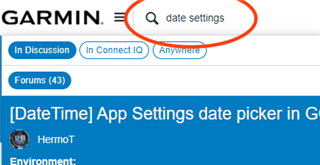I need to get the Month/Day/Year from the phone settings and I set date in settings on the phone to 1/1/2021 and I am getting 12/31/2020:
var countdown = Application.getApp().getProperty("CountDownDate");
var infoC=Gregorian.info(new Time.Moment(countdown), Time.FORMAT_SHORT);
var cyear = infoC.year;
var cmonth = infoC.month;
var cday = infoC.day;
System.println(" MyWatchFaceView - onUpdate - countdown:"+countdown+" cmonth:"+cmonth+" cday:"+cday+" cyear:"+cyear);
-------------------------------- output
MyWatchFaceView - onUpdate - countdown:1609459200 cmonth:12 cday:31 cyear:2020



